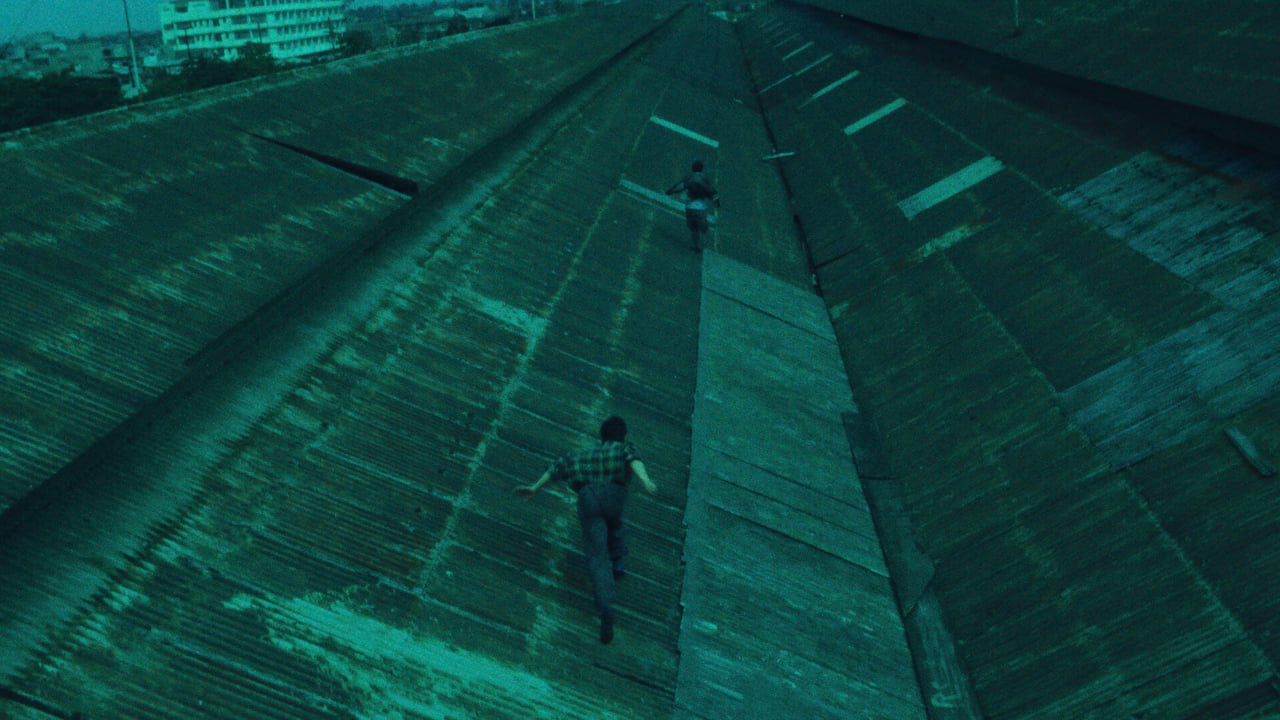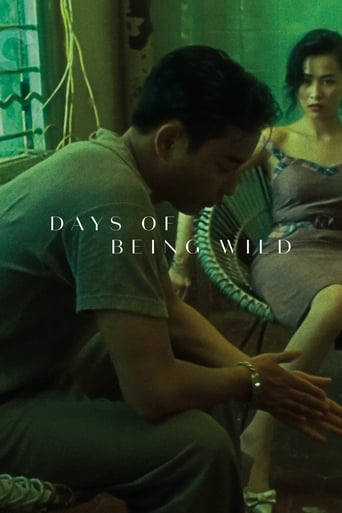

Sexy drama about a single bachelor living the free life - worry free - pleasuring himself to whatever and whomever he sees fit .. Secretly depressed about the abandonment of his birth mother , he decides to "fly" the rest of his life until he crashes downHis orphan mother (who runs a nightclub) takes care of him; two women fall in love with him - a homesick shopkeeper and a dancer from his mom's club; he has a peasant friend who tails him to ripe the reward of having a bachelor friend; and a naive cop watches him from a distance because he's secretly in love with the shopkeeperGood case study film on the inside life of random hook-ups8/10
... View MoreThough it has been argued that 'A Fei Zheng Chuan' (aka 'Days of Being Wild') is the first set of the trilogy which is completed by 'Fa Yeung Nin Wa' (aka 'In the Mood For Love') and '2046', it 'looks' different from the other two films. Kar Wai uses less colour, more shadow, rain and heat and more rawness. The tone is much darker than in 'Fa Yeung Nin Wa' as the film is set in the 50s. The music is beautiful and effectively used. And, here too Kar Wai ends up making a powerful product. Though this film was a box office failure, it is an artistic victory.'A Fei Zheng Chuan' tells the story of 6 individuals whose lives are interconnected by each character's search and struggle for an identity. It's about loneliness, unrequited love, lost love, the search for love, and how the search continues. Kar Wai clevely brings up the theme of sex (without showing any nudity). The writing is excellent and the characterization is strengthened by superb and unique performances. The late Leslie Cheung's Yuddy is not a very likable person but we do sympathize with this man and recognize him. Maggie Cheung as Su gives one of the most subtle and finest performances. Carina Lau is energetic and terrific as Mimi. Rebecca Pan gracefully downplays her part. Andy Lau's Tide and Jacky Cheung's Zeb too are relatable and the actors are nothing short of remarkable. Actually, I recognize all the characters in this film.I loved the cinematography, especially the long shots. One of my favorite shot is the introduction of the scene that glides from the Phillipine streets to Yuddy and Tide in a lunch bar. This is one fine example of skillful camera-work. The shaky camera (which thankfully isn't overdone) and the close-ups that mostly take place during conversations and intimate moments between two characters work very well. Doyle's camera-work simply guides us through the lives of these characters.Summing it up, 'A Fei Zheng Chuan' works on many levels. It is an excellent study of characters, it 'tells' a universal story in a poetic way and it is a fine cinematic experience.A bird that never lands will one day suddenly seize to exist.
... View MoreA film about time and dislocation; establishing themes that would be further explored in the director's later works, Chungking Express, Happy Together, and, more importantly, In The Mood For Love, and 2046. Wong had already stated that Days Of Being Wild should be seen as the first part in a trilogy of films, each dealing with the issues of love, obsession, time and memory, set against a back-drop of 1960's Hong Kong. Although I'm not going to delve into any great detail as to how these three films correlate to one another, it should be noted that the character of Su-Li Zhen, one of the first to be introduced in this film, is most likely the same Su-Li Zhen so pivotal to the relationships of In The Mood For Love and 2046. Also, there's the brief appearance by Tony Leung in the final scene here, with his character - hinted to be a gambling, feckless womaniser, not too dissimilar to Days' central character, Yuddy - seeming to be the blue-print for the character of Mr. Chow in those two aforementioned masterworks.As a stand-alone piece, Days can be appreciated for it's painterly style and lingering use of atmosphere. It certainly works better as a piece of entertainment if we tie it in with Wong's last two films, but there's nothing lost if you've yet to see them. At its heart, Days is a youth film, a melodrama about listless youth congregating around Yuddy, a Cantonese James Dean and legend in his own time. As a character, Yuddy can occasionally seem rather loathsome... he's an arrogant, feckless womaniser, who casts aside his conquests without compassion or humility. He also refuses to work... instead, he leaches off his adoptive mother, a former courtesan who longs for a new life with an unseen man in the U.S., but, at the same time, she refuses to live without the love of her son. It's this kind of emotional paradox that really defines Wong's work on this film, with many of the characters having contradictory elements that ultimately make them all the more human. It is also important to note the relationships between Yuddy and his - in a sense - two mothers (the one we see and the one we don't), as they are really the very backbone to the prevailing theme of the film.As he states himself towards the beginning of the film, Yuddy is a man who can't concern himself with the affections of one woman... however, this is the real point of interest in Wong's film, in the sense that what Yuddy really needs is the love of ONE woman, in this case, his birth mother. The torturous relationship between Yuddy and his adopted mother is straight out of a Hollywood melodrama, as the pair argue over money, aspirations, and their equally rootless personal lives... though, ultimately, the argument always comes back to Yuddy's quest for the mother that long-ago gave him away. The sensitive layers of this character, who at first appears to be completely devoid of human emotions, though, ultimately, proves himself to be a sensitive and isolated young soul, is exceptionally observed by Wong and perfectly performed by the late Leslie Cheung, in what is, perhaps, his best film role.Yuddy's influence on the other characters in the film is also important to note, as it establishes another thread to Wong's story... that being obsession, influence, emulation and mirroring. The first female character we are introduced to is the aforementioned Su-Li Zhen, a shy young woman who works in the ticket booth at the local sports stadium. The opening scenes of the film, which draw heavily on the repetitious use of imagery - with Wong and his cinematographer Christopher Doyle establishing a number of iconic images surrounding the characters (particularly time, which is a prevalent factor throughout) - show us Yuddy's various attempts to seduce the seemingly disinterested Su-Li. Eventually, through cool charm and empty sentiment, he manages to woo the young woman, holding her close to him in one of the film's key-scenes and declaring themselves "one-minute friends", as he counts down 60 seconds on his watch and says that wherever he goes, he'll always remember her for this shared-moment.The monologue here is another important theme, again, going back to the idea of time and wasted opportunities. Another thread to the story involves a lonely policeman who walks the late-night streets outside Yuddy's high-priced apartment. One night, after Su-Li realises that she has been replaced, by the brash showgirl Mimi (a.k.a. Lulu, another reoccurring character from 2046), the policeman comes to her aid... offering her cab fair home on the first night, then walking with her through the empty and nocturnal streets for a second. Eventually, the policeman will come to love Su-Li as obsessively as she loves the unconcerned Yuddy, a three-way relationship that will feature significantly in the film's final act...Throughout the film, Wong is playing with the conventions of the melodrama, in the way filmmakers like Fassbinder did in the 1970's, or Douglas Sirk before him, in the idea of taking certain characters, archetypes and iconography from Hollywood, but re-adapting them into a framework that is much more personal. The creation (or recreation) of 1960's Hong Kong is far removed from most period films, with Wong and Doyle creating an almost existential world of grasping nocturnal shadows and autumnal colours that seem to be modelled on the works of Edward Hopper. It's not quite as technically draw-dropping as his more recent films, in particular, the glorious visual fantasia of 2046, but it is, regardless, an important piece of work in the career of this master filmmaker.
... View MoreDays of Being Wild is the first film I've seen directed by Wong Kar-Wai as well as the first time I've seen any of the actors that I'll now list here: Leslie Cheung, Maggie Cheung, Andy Law, Carina Lau, and Tony Leung. Those beginning scenes with Leslie and Maggie are some of the most erotically charged I've seen in movies yet and I haven't seen too many adult dramas as you've probably guessed if you've read all my comments so far. The gradual, quiet, and eventual shattering desperateness that involves most of the characters made this movie very compelling even during very slow scenes in which nothing happens. Both Maggie and Carina Lau are sexy in their own way with their individual scenes with Leslie Cheung and their one confrontation is one of my favorite scenes here. Also loved Andy Lau's policeman character and his keeping Maggie company as she recovers from her affair with Leslie. Just about everything is compelling about Days of Being Wild though I admit being confused with Tony Leung's only scene at the end. Knowing that an unfinished sequel exists based on that frame makes me hope to one day get to be able to view it eventually...
... View More